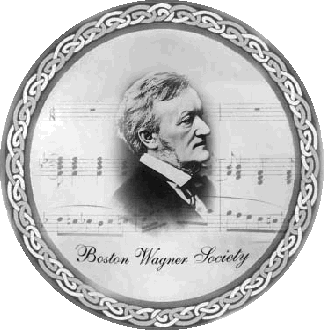Reviews & Interviews
Our archived blog, available for all to peruse, compiled by many BWS contributors.
At Last, Deborah Voigt: Der Fliegende Holländer at the BSO
Der fliegende Holländer, Boston Symphony Orchestra, March 11, 13 and 15, 2005, Symphony Hall.
When the Boston Symphony Orchestra announced its plans for the current season, the music-loving public, BSO enthusiasts, and especially Wagnerians had much to rejoice about. After all, it is not an everyday occurrence that finds this world-class orchestra supporting a gleaming all-star cast of Wagnerians in this work. Indeed, for many, these performances promised to be the crown jewel of Maestro Levine’s first season as full-time music director. Given the opportunity to hear the work three times in five days, this very long-term subscriber even bought an additional ticket at the start of the season in keen anticipation of being overwhelmed by floods of orgiastic Wagnerian sound.
From a Whimper to a Bang: Wagner with the BSO
March 19, Symphony Hall; Prelude to Lohengrin; Wesendonck Lieder, sung by Waltraud Meier; and the Ring, an orchestral adventure, arr. Henk de Vlieger; conducted by Edo de Waart.
Chips and Rhine Seltzer: Zagrosek’s Walküre on DVD
Staatsorchester Stuttgart, conducted by Lothar Zagrosek
Siegmund: Robert Gambill, Hunding: Attila Jun, Wotan: Jan-Hendrik Rootering, Sieglinde: Angela Denoke, Brünnhilde: Renate Behle, Fricka: Tichina Vaughn
Naxos/TDK DVD 20 5207 9 DVUS-OPRDNW
Length: 229 minutes
DVD of Das Rheingold Piques Viewer’s Interest
Das Rheingold: Staatsorchester Stuttgart, conducted by Lothar Zagrosek; stage director: Joachim Schlomer. Wotan: Wolfgang Probst; Fricka: Michaela Schuster; Alberich: Esa Ruuttunen; Freia: Helga Rós Indridadóttir; Mime: Eberhard Francesco Lorenz; Erda: Mette Ejsing; Donner: Motti Kestón; Froh: Bernhard Schneider; Loge: Robert Künzl; Woglinde: Catriona Smith; Wellgunde: Maria Theresa Ullrich; Flosshilde: Margarete Joswig. Studio: TDK/Naxos; video: 16:9; audio: dolby digital 5.1; extras: chapter selections; length: 152 minutes; rating: three and a half stars.
The Impossible Love: Tristan und Isolde
The Metropolitan Opera, conducted by James Levine
Tristan: Ben Heppner, Isolde: Jane Eaglen, King Marke: René Pape, Kurwenal: Hans-Joachim Ketelsen, Brangäne: Katarina Dalayman, Melot: Brian Davis
Set and Costume Design: Jürgen Rose
Lighting Design: Max Keller
Studio: DGG B0001745-09
Length: 238 minutes
Paul Heise Wows His Boston Audience
Paul Heise, an independent Wagnerian scholar who has assiduously studied Wagner’s works and writings for more than 30 years, favored us with a presentation on December 4, at Hill House, Beacon Hill (see his following article).
Titled “How Elsa Showed the Way to Siegfried: The Influence of Lohengrin on the Ring Cycle,” the talk lasted two and a half hours, with numerous interjections by an involved audience. One of Heise’s main tenets is that Wagner was influenced primarily by Feuerbach, and not by Schopenhauer as is commonly thought. Even after Wagner entered his allegedly Schopen-hauerian phase, he wrote in the vein of Feuer-bach. To prove his point, Heise presented his audience with a compendium of similar quotes from both authors.
Dr. Bauer Talks about King Ludwig II
On October 24, the eminent Wagnerian scholar Dr. Oswald Bauer, secretary general of the Bavarian Academie of Fine Arts and chair at Ludwig-Maximilians University and at the Academy of Visual Arts in Munich, came to Boston to present the first in a series of lectures devoted to the relationship between Richard Wagner and King Ludwig II. In the small hall of Hill House on Beacon Hill, a small but erudite audience of Wagnerians listened with careful attention to his prepared remarks and then asked wonderfully thought-provoking questions.
An Interview with Richard Beams
Richard Beams is the director of Opera con Brio, an opera-education program that is now in its 25th year. He is also assistant professor at Pine Manor College, a past recipient of NEH fellowships in both Opera and Literature and Verdi Studies, and a pre-opera lecturer for the Boston Lyric Opera.
Winberg, Stevens, and Brody Charm the Boston Wagner Society
On May 23, the First and Second Church on Marlborough Street in Boston resonated with the glorious sounds of Wagner’s operas. Singing extended excerpts from Parsifal, Tannhäuser, Tristan und Isolde, Die Walküre, Götterdämmerung, and Siegfried, soprano Annalisa Winberg, heldentenor Roy Stevens, and pianist Jeffrey Brody could easily have filled a room the size of Symphony Hall with their outstanding music making.
Icelandic Sagas of the Ring Cycle
The Society's second lecture program, on April 23 at the Union Club, featured Dr. Árni Björnsson, who had just arrived from Reykjavik on a tour to promote his new book [Wagner and the Volsungs: Icelandic Sources of DER RING DES NIBELUNGEN, by Árni Björnsson, pub-lished by the Viking Society for Northern Research, University College, London, ISBN 0 903521 55 5; see the review in the April–May issue of Wagneriana] on the Icelandic sources of Wagner's Ring. A noted scholar, lecturer in Icelandic language and literature, and past director of the Folklore Department of the National Museum of Iceland, Björnsson was a genial, soft-spoken, but energetic scholar whose profile bore a startling mirror-image resemblance to Richard Wagner's own on the cover of his book as enlarged by the slide projector.
A Conversation with Edo de Waart and Waltraud Meier
On March 16 conductor Edo de Waart and mezzo-soprano Waltraud Meier, in Boston for a BSO concert (see the following review), gave a talk at Harvard University’s Paine Hall entitled “Wagner in Theory and Practice.” This event was cosponsored by the Music Department of the BSO and the Humanities Center of Harvard University. Here is an abridged, somewhat paraphrased synopsis.
